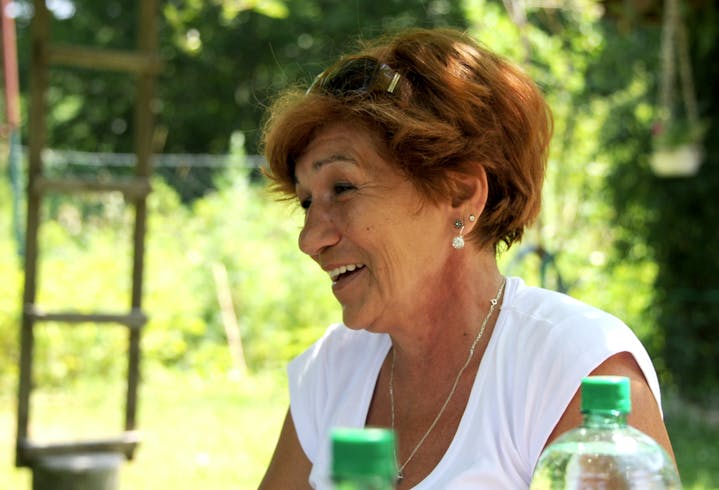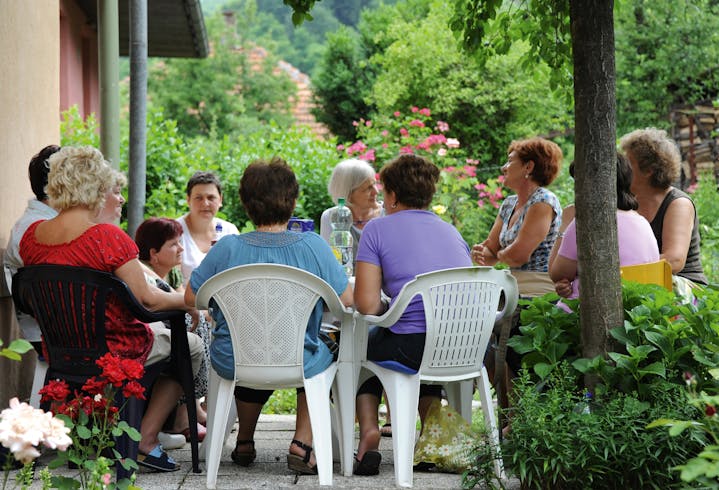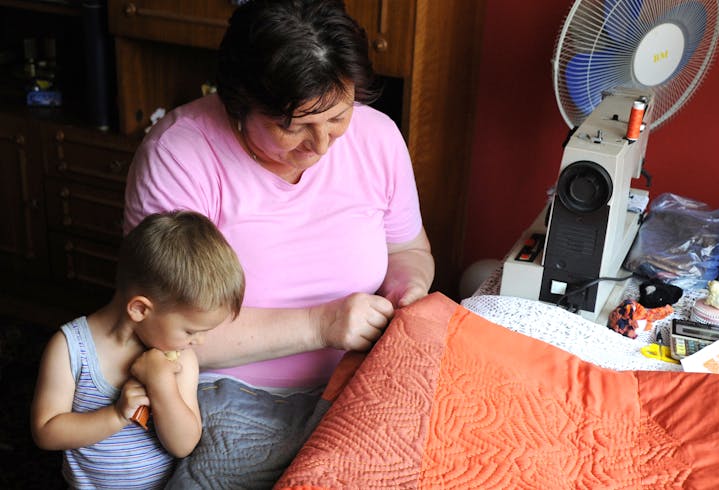Yes, the Bosna Quilts, we make them

We speak different languages. We live in different countries. We don't even belong to the same religion. And we are a wonderfully well-coordinated team. We have been working together since 1998. We've made a lot of quilts since then – about two thousand in total. And we try to approach every one as if it were our first.
«It's my life and my love,» Safira once said about working with the quilts. We think that applies to all of us.

Lucia Lienhard-Giesinger, founder and artistic director of the Bosna Quilt Workshop, Bregenz, Austria

When Lucia hears about the possibility of artistic cooperation with Bosnian refugee women, she is enthusiastic. Lucia is a painter, but she decides to make quilts with the women although she has never made one herself. In 1993, she drives to the Galina refugee home in Frastanz for the first time, with a pile of fabrics and a few drafts. Together, the refugee women and the artist make the first quilts here, in a former garage. The initial division of labor is still in place: Lucia makes the design, the women sew over it. The process is new for everyone, for Lucia and the women who take part. This turned out to be a stroke of luck: Lucia and the Bosnian seamstresses «reinvent» the quilt together.
> Read more about this under «Bosna Quilts are children of war».

Safira Hošo, manager of the Bosna Quilt Workshop in Goražde, Bosnia

Safira is stranded on the run from the war with her family in the Galina refugee home in Vorarlberg. There she meets Lucia. She is part of the quilting group from the start. When the refugees have to or are allowed to return home after the end of the war, Safira suggests continuing the Bosna Quilt Workshop anyway. That sounds utopian at first, but it succeeds thanks to the help of many people. Today, Safira runs the workshop in Goražde and coordinates the work of the seamstresses with exceptional prudence and reliability.
The picture shows a working meeting in Safira's garden on the occasion of a visit by Lucia.

Sabina Dolo, Goražde

Sabina (left in the picture, with Safira) survives the war in Goražde. She hears from Safira, who has just returned to her home country from Austria and is looking for women who want to take part in the Bosna Quilt Workshop. She is accepted into the group, together with nine other women who also stayed in Bosnia during the war and were recruited by Safira for the Bosna Quilt Project. Everyone in Goražde, whether they have stayed or fled and returned home, has to build a new existence for themselves in the destroyed city. The fact that Safira is returning home with this quilting project is a godsend for many households.
Today, Sabina lives in the same house as her son's family. Because she wants to spend time with her grandchildren, she only sews smaller quilts. Sabina also writes songs and poems. Here, she reads us a poem about the Bosna Quilt Workshop, a poem about colors, hope and love. Safira translates.

Ševala Hadžimesić, Sarajevo

Ševala lived in Goražde for a long time. But now she has moved to Sarajevo with her daughter, they now live in a suburb near the airport. When Safira has a new quilt design for her, Ševala gets on a Sarajevo tram, perhaps riding a tram car that used to run in Vienna, Amsterdam or Cologne. (After the war, Sarajevo received decommissioned cars from various cities.) At the other end of town, Ševala takes the bus to Goražde. It takes her about two hours to complete the approximately 100 kilometers.
In the photo, Ševala is walking with Lucia through a park in Ilidža, just outside Sarajevo.

Emina Hošo, Goražde

Emina can do anything. She is an excellent quilter, but she can also pour concrete, lay tiles and install electrical outlets. All by herself, and with an irrepressible desire to design, she beautifully renovated her little weekend house, which was used as a hospital during the war. If she wants to make a border for a flower bed, she decorates the wall with small pebbles from the Drina. From there she also catches the fish she barbecues in her backyard kitchen. Her garden down by the river also produces vegetables in abundance.
Emina laughs a lot. But that can be deceiving. In Bielefeld, where she was able to get to safety from the war, she cried a lot. And sadness can still overwhelm her today.

Munira Karo, Goražde

If you go up from the city to Munira's house, you have to keep left after the weapons factory and then follow a small road. She lives where the greenhouse is. You can see how much Munira works. She is small and wiry and always has something to do. She took care of her husband, who suffered from kidney disease, for a long time. He died a few years ago. Fortunately, Munira's daughter lives on the ground floor. That is why her grandchildren come and go with her. When you come into the living room, grandson Adi is sure to be lying on the sofa and playing with the cell phone. In one corner, like an altar, is a small table with a computer on it. From here Munira maintains contact with her son and his family and with her brothers, who all live in Lyon.
For a long time, Munira has been quilting amazing pieces. She combines her ornaments so boldly that you only see the richness of a Munira quilt at a second and third glance.

Hedija Kazagić, Goražde

When Hedija has a new quilt in the works, Salim, her husband, makes sure that he can protect his wife’s time as best he can. Then, he cooks or does the shopping although he works at the gas station down on main street, night shift and all. Salim is not one of those men who let his wife wait in him. He also has no problem with Hedija contributing a good part of the income.
Whenever we visit Bosnia, we all go out to eat together. The men are also there. Once at the end, Salim proposes a toast to express gratitude for the invitation. «Bosna Quilt Werkstatt is the better company than my gas station,» he says with a wink. His gas station has never invited him to a meal like this.

Mirza Kozo, Goražde

Mirza lives with her husband Eso in a house not far from the banks of the River Drina, but not as close to it as they had lived until 2010. Unfortunately, the Drina has become dangerous. Because the Mratinje power plant in Montenegro routinely opens the locks of its dam without warning, the water level can quickly rise by up to two meters. This is why the people of Goražde can no longer bathe in the Drina. In December 2010, when it had been raining far too long, the power plant had to drain water because its reservoir was full. Mirza and Eso's house was under water up to the roof. The two lost everything, but later built a new house on a slightly higher plot. Eso recorded the Drina water level from 2010 on the wall next to the entrance.
But neither war nor floods have robbed Mirza of her humor--she can be incredibly mischievous. Her way of quilting is also unique: Mirza does not make ornaments, but taunts the surface with wild stitches until an attractive overall picture emerges.

Vesna Malokas, Goražde

This is the view from Vesna's apartment on the sixth floor. In the foreground we see the post office’s cell phone antenna, in the background the rolling hills with the rural hamlets that still belong to the city. The roofs are all covered with the same tiles, which makes the small villages look strangely uniform. After the war, re-roofing the bombed houses to create shelter was one of the most urgent relief measures. Vesna dreams of living in such a house in the countryside. Maybe this will remain a dream. As for so many Bosnians, Vesna's financial leeway is extremely limited.
If you watch Vesna sew, how carefully and precisely she sews her seams, you could imagine her in a small garden, under the plum tree, the quilt on her knees, the beans and peppers in the background. And a grandchild's tricycle in the grass. But how the bike is now in the dark corridor of the apartment block, and that's how it must be.

Mirza Mašić, Goražde

When Mirza invites you for dinner, you should show up with a healthy appetite. Because she cooks really well. Not only that: She also produces almost all of her ingredients. The vegetables and fruits are from the plastic greenhouse, the pickles from the cellar, meat and cream cheese from the stable, but please don’t forget the plentiful homemade Slivovitz. Of course, Mirza doesn't do this alone. Her husband, Rashed, is just as hard a worker as she is. The two are practically self-sufficient. They live with Mirza's mother, Saha, just outside of Goražde, in the Republika Srbska--the Serbian part of Bosnia where they lived before the war. Returning after the war was anything but easy. But now they are back at home in Kopači.

Sada Srna, Goražde

When Sada looks out of the window, she sees the Drina valley and the Serbian Orthodox cemetery. Goražde is an enclave in Bosnia’s post-war order, surrounded by Serbian villages. Sada and her husband Ekrem live here with their sheep. It is an idyllic setting, but they are also lonely.
We are visiting when we notice how carefully the burly Ekrem handles the quilts. «Do you like what Sada sews?» We ask. «Of course,» replies Ekrem, «I'll do half of it». And then admits that he supports his wife especially when the sewn-together pieces of fabric arrive from Austria and it is important to sew them together according to the plan and exactly to size. Sada has a certain respect for that and is therefore grateful to be able to count on her husband's help.

Ćamila Sudić, Goražde

Camila (on the right in the picture), her husband Eso and their two children Minela and Elmin have not always lived in Goražde; they are from the mountain town of Sudići. When the war came, the family didn’t believe that violence would reach their small mountain village. Unfortunately, they were wrong. The family had to flee with their two small children, and lived in the woods before reaching the besieged Goražde. When she found shelter in an abandoned house close to Safira’s, Camila became a member of the Bosna Quilt Workshop.
In 2018, Camila's husband Eso died unexpectedly during a routine heart examination. A little later, her son Elmin found a job as a computer scientist in Graz (Austria) and emigrated there. The two women, Camila and her daughter Minela (left), remained behind. A typical Bosnian family story: The war tore families apart and decimated them. Many remained in exile after fleeing. And many died, during or after the war. Of the eleven women in the Bosna Quilt Workshop, six have lost their husbands, most of them after the war.